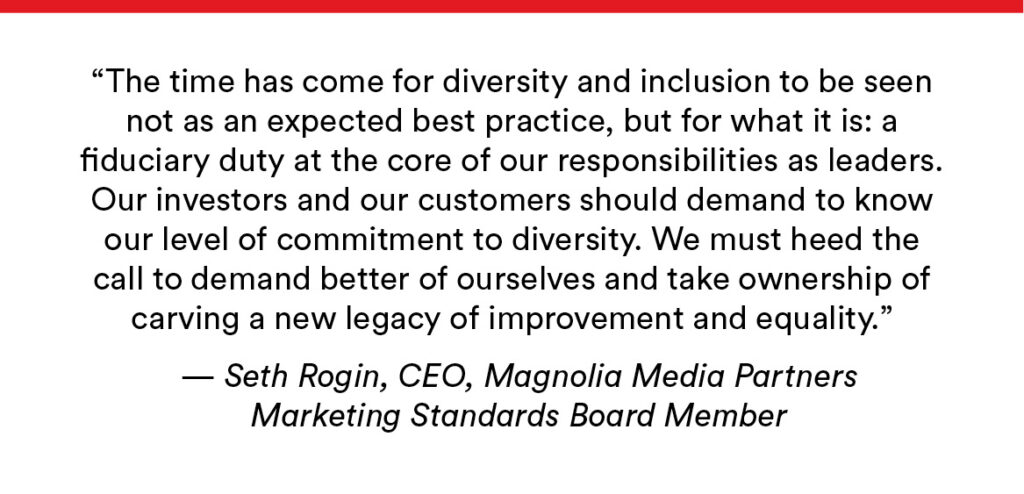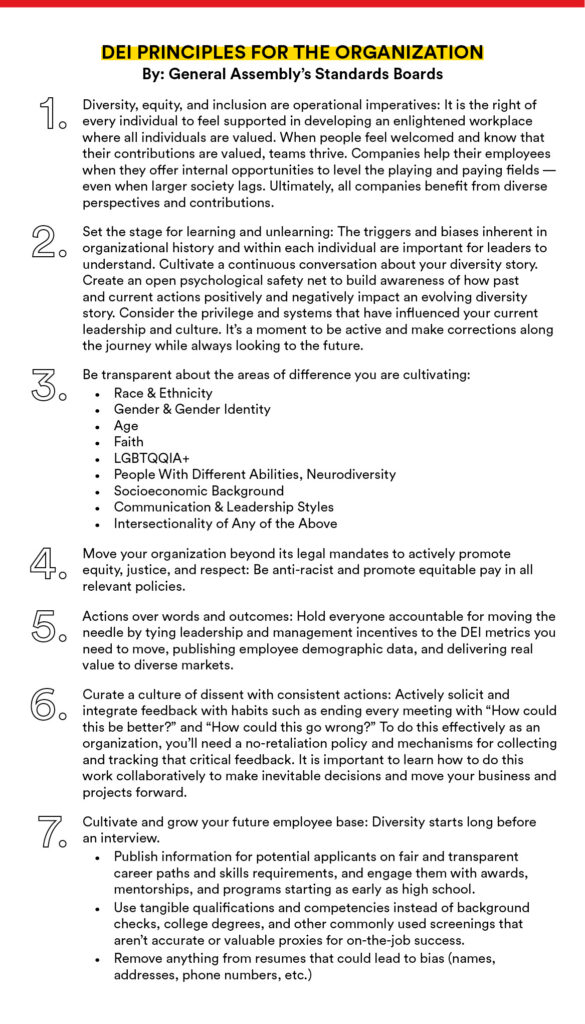Systemic racism has been a critical problem for generations, and the Black Lives Matter (BLM) movement has brought centuries of injustice to the spotlight. Over the last six months, following the deaths of Ahmaud Arbery, Breonna Taylor, George Floyd, and so many others, individuals worldwide have taken a stand to fight oppression and discrimination against Black, Indigenous, and People of Color (BIPOC).
It’s an inflamed and sensitive time that calls for radical change. Diverse companies not only outperform their less diverse peers, but they also forge stronger connections with their customers. 77% of U.S. consumers said it was “deeply important that companies respond to racial injustice to earn or keep their trust.” As consumer bases diversify and consumers change their spending habits, companies need to ensure that their content, messaging, product, design, and data align with these shifts. While organizations know they need stronger commitments to diversity, equity, and inclusion (DEI), many don��t know where to start �� individual companies often take action but lack coordinated guidance.
Our Standards Boards were established to increase the clarity of and access to careers in marketing, AI & data science, product management, and UX design. To date, the Boards have primarily focused on providing clarity on the skills needed within specific fields by publishing career frameworks and certifications. Now, it��s time to connect to the access portion of their work. Together, the Standards Boards have crafted DEI principles that guide organizations on how to provide equitable access to skills and career paths for their employees.

Improving Diversity, Equity, & Inclusion: A Practical Guide
To create a meaningful guide to DEI, our Standards Board Members reflected on what diversity, equity, and inclusion meant as individuals, employees, and leaders of organizations. With this in mind, we focused on improving the current DEI practices each member saw being used and creating a practical playbook that could be applied across companies and disciplines. Ultimately, we hope this playbook serves as a starting point for conversations around DEI that lead to career paths for diverse talent and helps leaders create work environments in which all can succeed.
Our Standards Board DEI task force drafted a playbook of seven overarching principles that have been refined through feedback from colleagues, DEI experts, GA instructors and staff, plus more. These principles were designed to guide any organization��s DEI strategy, regardless of function, industry, geography, or company size.
These principles were created by leaders in various industries who have a real conviction for driving change. Below, you��ll find a few principles our board members stand behind; they hope you��ll use these to drive conversations and assess how your organization is implementing DEI.

Marla Kaplowitz, president and CEO at 4A��s noted:
��We all recognize a critical need to address systemic issues with diversity, equity, and inclusion through actions �� not just words. These principles were created to support action plans for every company to ensure a culture of belonging for all employees, at all levels throughout the organization.”
We hope these principles spark conversations at your organizations that lead to tactical activities such as revisiting policies, analyzing pay equity, and tracking diversity data. While some of these principles are being implemented across board member organizations, some aren’t. Our intention is to enable organizations to implement DEI policies across every level of an organization through actions, not just words.
The Actions We Are Taking
It��s essential that these aforementioned principles are put into action. Across the Standards Boards, we��ll be incorporating DEI into career frameworks, assessments, and products. We��ll also be actively recruiting more board members in 2021 to ensure our boards are representative of the talent in their industries.
Within GA, we��re also committed to aligning these principles with our work. We��re actively promoting equity and justice by using our platform to discuss why we should all be angry, and we��re making real commitments to ensure we��re not idle in the face of systemic racism. We��re cultivating conversations about our diversity story and creating a culture of dissent through creating an Inclusion Committee as well as a Fireside Chat series that brings employees and executives together for candid conversations on D&I (both started in 2019).

We��re cultivating our future employee base by updating our policies to require a diverse slate of interview candidates for all leadership-level positions, revisiting internal promotion criteria, and launching a mentorship program (Code Grow) so our Black, Indigenous, and People of Color (BIPOC) staff has formal avenues to develop their careers. To attract diverse talent, we are utilizing outlier career-search platforms like AngelList, Underdog.io, Vettery, c0ffe3, Black Creatives, and more.
We��re transparent about the areas of difference we��re cultivating by reformalizing our Employee Resource Groups (ERGs) with dedicated executive sponsors. And we��re tying outcomes to actions by measuring all our people metrics and making plans to improve the experiences of underrepresented groups in our organization. We��re also ensuring DEI is central in our product development.
The principles set forward by the Standards Boards are essential to capturing many voices across multiple sectors because they encapsulate what has been learned on our individual and collective journeys. We look to evolving and integrating these principles into GA’s courses, continue the hard work and commitment to DEI at GA, and further develop organizational behaviors, along with the willingness of our Standards Board partners to do the same.
The list below notes the leaders that have signed on. If you��re a leader who is ready to join us and adopt these principles, you can sign on here.
Participating Leaders:
Shri Bhupathi, Founder and Technical Fellow, MILL5
Gideon Bullock
Andrea Chesleigh
Chad Evans, SVP, Product and Platform, NBA
Stephen Gates
Benjamin Harrell, Chief Marketing Officer, Priceline
Marla Kaplowitz, President and CEO, 4A’s
Willy Lai
Louis Lecat
Kevin Lyons, SVP of Technology, Nielsen
Francisco Martin, Head of Business Development, Thrive Global
Marilyn McDonald, SVP of B2B Experiences, Mastercard
Kristof Neirynck, CMO of Global Brands, Walgreens Boots Alliance
Gretchen O��Hara, VP of AI & Sustainability, Strategy & Partnership, Microsoft
Michelle Onvural, CEO, Bonobos
Seth Rogin, CEO, Magnolia Media Partners
Nick Perugini
Adam Powers
Professor Andrew Stephen, Associate Dean of Research & L��Or��al Professor of Marketing
Linda Tong, 足球竞彩网 Manager, AppDynamics (a Cisco 足球竞彩网)
Sang Valte, UX Director, Jellyfish
It’s a new world that calls for moral bravery and clear actions. We welcome all feedback on these principles and look forward to hearing how your organization implements these and other DEI initiatives.
